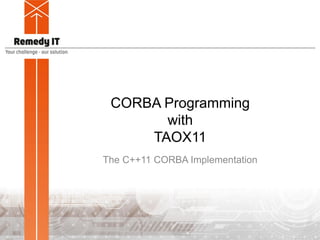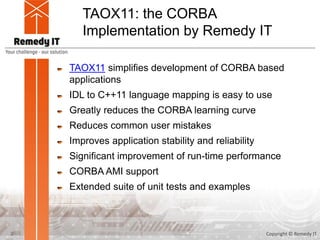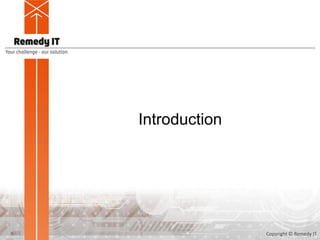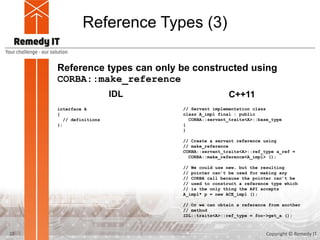CORBA Programming with TAOX11/C++11 tutorial
- 1. CORBA Programming with TAOX11 The C++11 CORBA Implementation
- 2. TAOX11: the CORBA Implementation by Remedy IT TAOX11 simplifies development of CORBA based applications IDL to C++11 language mapping is easy to use Greatly reduces the CORBA learning curve Reduces common user mistakes Improves application stability and reliability Significant improvement of run-time performance CORBA AMI support Extended suite of unit tests and examples Copyright © Remedy IT2
- 3. TAOX11 Commercial CORBA implementation by Remedy IT Compliant with the OMG IDL to C++11 language mapping IDL compiler with front end supporting IDL2, IDL3, and IDL3+ Free evaluation versions available from our software support portal ! More details on https://taox11.remedy.nl/ 3 Copyright © Remedy IT
- 4. Tutorial overview This tutorial gives an overview of the IDL to C++11 language mapping Introduces TAOX11, the C++11 CORBA implementation by Remedy IT It assumes basic understanding of IDL and CORBA 4 Copyright © Remedy IT
- 5. Introduction 5 Copyright © Remedy IT
- 6. Problems with IDL to C++ The IDL to C++ language mapping is from the 90’s IDL to C++ could not depend on various C++ features as • C++ namespace • C++ exceptions • Standard Template Library As a result the IDL to C++ language mapping • Is hard to use correctly • Uses its own constructs for everything 6 Copyright © Remedy IT
- 7. Why a new language mapping? IDL to C++ language mapping is impossible to change because • Multiple implementations are on the market (open source and commercial) • A huge amount of applications have been developed An updated IDL to C++ language mapping would force all vendors and users to update their products The standardization of a new C++ revision in 2011 (ISO/IEC 14882:2011, called C++11) gives the opportunity to define a new language mapping • C++11 features are not backward compatible with C++03 or C++99 • A new C++11 mapping leaves the existing mapping intact 7 Copyright © Remedy IT
- 8. Goals of IDL to C++11 Simplify mapping for C++ Make use of the new C++11 features to • Reduce amount of application code • Reduce amount of possible errors made • Gain runtime performance • Speedup development and testing Faster time to market Reduced costs Reduced training time 8 Copyright © Remedy IT
- 9. OMG Specification IDL to C++11 v1.3 available from the OMG website at http://www.omg.org/spec/CPP11/ Revision Task Force (RTF) is active to work on issues reported 9 Copyright © Remedy IT
- 10. IDL Constructs 10 Copyright © Remedy IT
- 11. Modules An IDL module maps to a C++ namespace with the same name module M { // definitions }; module A { module B { // definitions }; }; IDL C++11 namespace M { // definitions }; namespace A { namespace B { // definitions }; }; 11 Copyright © Remedy IT
- 12. Basic Types IDL C++11 Default value short int16_t 0 long int32_t 0 long long int64_t 0 unsigned short uint16_t 0 unsigned long uint32_t 0 unsigned long long uint64_t 0 float float 0.0 double double 0.0 long double long double 0.0 char char 0 wchar wchar_t 0 boolean bool false octet uint8_t 0 12 Copyright © Remedy IT
- 13. Constants IDL constants are mapped to C++11 constants using constexpr when possible const string name = "testing"; interface A { const float value = 6.23; }; IDL C++11 const std::string name {"testing"}; class A { public: static constexpr float value {6.23F}; }; 13 Copyright © Remedy IT
- 14. String Types No need to introduce an IDL specific type mapping but leverage STL string name; wstring w_name; IDL C++11 std::string name {“Hello”}; std::wstring w_name; std::cout << name << std::endl; 14 Copyright © Remedy IT
- 15. Enumerations IDL enums map to C++11 strongly typed enums enum Color { red, green, blue }; IDL C++11 enum class Color : uint32_t { red, green, blue }; Color mycolor {Color::red}; if (mycolor == Color::red) { std::cout << “Correct color”; } else { std::cerr << “Incorrect color “ << mycolor << std::endl; } 15 Copyright © Remedy IT
- 16. Sequence IDL unbounded sequence maps to std::vector typedef sequence<long> LongSeq; typedef sequence<LongSeq, 3> LongSeqSeq; IDL C++11 typedef std::vector <int32_t> LongSeq; typedef std::vector <LongSeq> LongSeqSeq; LongSeq mysequence; // Add an element to the vector mysequence.push_back (5); // Dump using C++11 range based for loop for (const int32_t& e : mysequence) { std::cout << e << “;” << std::end; } 16 Copyright © Remedy IT
- 17. Struct (1) IDL struct maps to a C++ class with copy and move constructors/assignment operators and accessors struct Variable { string name; }; IDL C++11 class Variable { public: Variable (); ~Variable (); Variable (const Variable&); Variable (Variable&&); Variable& operator= (const Variable& x); Variable& operator= (Variable&& x); explicit Variable (std::string name); void name (const std::string& _name); void name (std::string&& _name); const std::string& name () const; std::string& name (); }; namespace std { template <> void swap (Variable& m1, Variable& m2); }; 17 Copyright © Remedy IT
- 18. Struct (2) IDL struct maps to a C++ class with copy and move constructors/assignment operators and accessors struct Variable { string name; }; IDL C++11 Variable v; Variable v2 (“Hello”); std::string myname {“Hello”}; // Set a struct member v.name (myname); // Get a struct member std::cout << “name” << v.name () << std::endl; if (v != v2) { std::cerr << “names are different” <<std::endl; } 18 Copyright © Remedy IT
- 19. Array IDL array map to C++11 std::array typedef long L[10]; typedef string V[10]; typedef string M[1][2][3]; IDL C++11 typedef std::array <int32_t, 10> L; typedef std::array <std::string, 10> V; typedef std::array <std::array <std::array <std::string, 3>, 2>, 1> M; // Initialize the array F f = { {1, 2, 3, 4, 5} } // Check the size of an array if (f.size () != 5) 19 Copyright © Remedy IT
- 20. Reference Types (1) An IDL interface maps to so called reference types Reference types are reference counted, for example given type A • Strong reference type behaves like std::shared_ptr and is available as IDL::traits<A>::ref_type • Weak reference type behaves like std::weak_ptr and is available as IDL::traits<A>::weak_ref_type A nil reference type is represented as nullptr Invoking an operation on a nil reference results in a INV_OBJREF exception 20 Copyright © Remedy IT
- 21. Reference Types (2) Given IDL type A the mapping delivers IDL::traits<A> with type traits interface A { // definitions }; IDL C++11 // Obtain a reference IDL::traits<A>::ref_type a = // .. obtain a // reference // Obtain a weak reference IDL::traits<A>::weak_ref_type w = a.weak_reference(); // Obtain a strong reference from a weak one IDL::traits<A>::ref_type p = w.lock (); if (a == nullptr) // Legal comparisons if (a != nullptr ) // legal comparison if (a) // legal usage, true if a != nullptr if (!a) // legal usage, true if a == nullptr if (a == 0) // illegal, results in a compile // error delete a; // illegal, results in a compile error 21 Copyright © Remedy IT
- 22. Reference Types (3) Reference types can only be constructed using CORBA::make_reference interface A { // definitions }; IDL C++11 // Servant implementation class class A_impl final : public CORBA::servant_traits<A>::base_type { } // Create a servant reference using // make_reference CORBA::servant_traits<A>::ref_type a_ref = CORBA::make_reference<A_impl> (); // We could use new, but the resulting // pointer can’t be used for making any // CORBA call because the pointer can’t be // used to construct a reference type which // is the only thing the API accepts A_impl* p = new ACE_impl (); // Or we can obtain a reference from another // method IDL::traits<A>::ref_type = foo->get_a (); 22 Copyright © Remedy IT
- 23. Reference Types (4) Widening and narrowing references interface A { // definitions }; interface B : A { // definitions }; IDL C++11 IDL::traits<B>::ref_type bp = ... // Implicit widening IDL::traits<A>::ref_type ap = bp; // Implicit widening IDL::traits<Object>::ref_type objp = bp; // Implicit widening objp = ap; // Explicit narrowing bp = IDL::traits<B>::narrow (ap) 23 Copyright © Remedy IT
- 24. Argument Passing Simplified rules for argument passing compared to IDL to C++ No need for new/delete when passing arguments The C++11 move semantics can be used to prevent copying of data Given an argument of A of type P: • In: for all primitive types, enums, and reference types, the argument is passed as P. For all other types, the argument is passed as const P& • Inout: passed as P& • Out: passed as P& • Return type: returned as P 24 Copyright © Remedy IT
- 25. IDL Traits For each IDL type a IDL::traits<> specialization will be provided The IDL traits contain a set of members with meta information for the specific IDL type The IDL traits are especially useful for template meta programming Copyright © Remedy IT25
- 26. Implement Interfaces Given a local interface A the implementation has to be derived from IDL::traits<A>::base_type Given a regular interface A the CORBA servant implementation has to be derived from CORBA::servant_traits<A>::base_type In both cases a client reference is available as IDL::traits<A>::ref_type Copyright © Remedy IT26
- 27. CORBA AMI TAOX11 has support for the callback CORBA AMI support The TAO AMI implementation has the disadvantage that when AMI is enabled for an IDL file all users have to include the TAO Messaging library TAOX11 separates CORBA AMI into a new set of source files, a client not needing AMI doesn’t have to link any CORBA Messaging support! All sendc_ operations are member of a derived CORBA AMI stub, not part of the regular synchronous stub Copyright © Remedy IT27
- 28. CORBA AMI Traits Instead of remembering some specific naming rules a new CORBA::amic_traits<> trait has been defined Contains the concrete types as members • replyhandler_base_type: the base type for implementing the reply handler servant • replyhandler_servant_ref_type: the type for a reference to the servant of the reply handler • ref_type: the client reference to the stub with all synchronous operations Copyright © Remedy IT28
- 29. CORBA AMI Example // Obtain a regular object reference from somewhere, Test::A has one method called foo IDL::traits<Test::A>::ref_type stub = …; // Narrow the regular object reference to the CORBA AMI stub (assuming this has been // enabled during code generation CORBA::amic_traits<Test::A>::ref_type async_stub = CORBA::amic_traits<Test::A>::narrow (stub); // Assume we have a Handler class as reply handler implemented, create it and // register this as CORBA servant CORBA::amic_traits<Test::A>::replyhandler_servant_ref_type h = CORBA::make_reference<Handler> (); PortableServer::ObjectId id = root_poa->activate_object (h); IDL::traits<CORBA::Object>::ref_type handler_ref = root_poa->id_to_reference (id); CORBA::amic_traits<Test::A>::replyhandler_ref_type test_handler = CORBA::amic_traits<Test::A>::replyhandler_traits:::narrow (handler_ref); // Invoke an asynchronous operation, can only be done on async_stub, not on stub async_stub->sendc_foo (test_handler, 12); // But we can also invoke a synchronous call async_stub->foo (12); Copyright © Remedy IT29
- 30. Valuetypes Valuetypes are mapped to a set of classes which are accessible through the IDL::traits<> • IDL::traits<>::base_type provides the abstract base class from which the valuetype implementation could be derived from • IDL::traits<>::obv_type provides the object by value class that implements already all state accessors and from which the valuetype implementation can be derived from • IDL::traits<>::factory_type provides base class for the valuetype factory implementation Copyright © Remedy IT30
- 31. Example CORBA application 31 Copyright © Remedy IT
- 32. CORBA Hello world interface Hello { /// Return a simple string string get_string (); /// A method to shutdown the server oneway void shutdown (); }; IDL 32 Copyright © Remedy IT
- 33. CORBA client int main(int argc, char* argv[]) { try { // Obtain the ORB IDL::traits<CORBA::ORB>::ref_type orb = CORBA::ORB_init (argc, argv); // Create the object reference IDL::traits<CORBA::Object>::ref_type obj = orb->string_to_object ("file://test.ior"); // Narrow it to the needed type IDL::traits<Test::Hello>::ref_type hello = IDL::traits<Test::Hello>::narrow (obj); // Invoke a method, invoking on a nil reference will result in an exception std::cout << "hello->get_string () returned " << hello->get_string () << std::endl; // Shutdown the server hello->shutdown (); // Cleanup our ORB orb->destroy (); } catch (const std::exception& e) { // All exceptions are derived from std::exception std::cerr << "exception caught: " << e.what () << std::endl; } return 0; } 33 Copyright © Remedy IT
- 34. CORBA servant C++11 CORBA servant for type T must be derived from CORBA::servant_traits<T>::base_type class Hello final : public CORBA::servant_traits<Test::Hello>::base_type { public: // Constructor Hello (IDL::traits<CORBA::ORB>::ref_type orb) : orb_ (orb) {} // Destructor virtual ~Hello () {} // Implement pure virtual methods from the base_type virtual std::string get_string () override { return “Hello!”; } virtual void shutdown () override { this->orb_->shutdown (false); } private: // Use an ORB reference to shutdown the application. IDL::traits<CORBA::ORB>::ref_type orb_; }; 34 Copyright © Remedy IT
- 35. CORBA server (1) int main(int argc, char* argv[]) { try { // Obtain our ORB IDL::traits<CORBA::ORB>::ref_type orb = CORBA::ORB_init (argc, argv); // Obtain our POA and POAManager IDL::traits<CORBA::Object>::ref_type obj = orb->resolve_initial_references ("RootPOA"); IDL::traits<PortableServer::POA>::ref_type root_poa = IDL::traits<PortableServer::POA>::narrow (obj); IDL::traits<PortableServer::POAManager>::ref_type poaman = root_poa->the_POAManager (); // Create the servant CORBA::servant_traits<Test::Hello>::ref_type hello_impl = CORBA::make_reference<Hello> (orb); // Activate the servant as CORBA object PortableServer::ObjectId id = root_poa->activate_object (hello_impl); IDL::traits<CORBA::Object>::ref_type hello_obj = root_poa->id_to_reference (id); IDL::traits<Test::Hello>::ref_type hello = IDL::traits<Test::Hello>::narrow (hello_obj); // Put the IOR on disk std::string ior = orb->object_to_string (hello); std::ofstream fos("test.ior"); fos << ior; fos.close (); 35 Copyright © Remedy IT
- 36. CORBA server (2) // Activate our POA poaman->activate (); // And run the ORB, this method will return at the moment the ORB has been shutdown orb->run (); // Cleanup our resources root_poa->destroy (true, true); orb->destroy (); } catch (const std::exception& e) { // Any exception will be caught here std::cerr << "exception caught: " << e.what () << std::endl; } return 0; } 36 Copyright © Remedy IT
- 37. Auto specifier C++11 has support for auto as new type specifier The compiler will deduce the type of a variable automatically from its initializers Will simplify the CORBA example further Copyright © Remedy IT37
- 38. CORBA client int main(int argc, char* argv[]) { try { // Obtain the ORB auto orb = CORBA::ORB_init (argc, argv); // Create the object reference auto obj = orb->string_to_object ("file://test.ior"); // Narrow it to the needed type auto hello = IDL::traits<Test::Hello>::narrow (obj); // Invoke a method, invoking on a nil reference will result in an exception std::cout << "hello->get_string () returned " << hello->get_string () << std::endl; // Shutdown the server hello->shutdown (); // Cleanup our ORB orb->destroy (); } catch (const std::exception& e) { // All exceptions are derived from std::exception std::cerr << "exception caught: " << e.what () << std::endl; } return 0; } 38 Copyright © Remedy IT
- 39. CORBA servant C++11 CORBA servant for type T must be derived from CORBA::servant_traits<T>::base_type class Hello final : public CORBA::servant_traits<Test::Hello>::base_type { public: // Constructor Hello (IDL::traits<CORBA::ORB>::ref_type orb) : orb_ (orb) {} // Destructor virtual ~Hello () {} // Implement pure virtual methods from the base_type virtual std::string get_string () override { return “Hello!”; } virtual void shutdown () override { this->orb_->shutdown (false); } private: // Use an ORB reference to shutdown the application. IDL::traits<CORBA::ORB>::ref_type orb_; }; 39 Copyright © Remedy IT
- 40. CORBA server (1) int main(int argc, char* argv[]) { try { // Obtain our ORB auto _orb = CORBA::ORB_init (argc, argv); // Obtain our POA and POAManager auto obj = _orb->resolve_initial_references ("RootPOA"); auto root_poa = IDL::traits<PortableServer::POA>::narrow (obj); auto poaman = root_poa->the_POAManager (); // Create the servant auto hello_impl = CORBA::make_reference<Hello> (orb); // Activate the servant as CORBA object auto id = root_poa->activate_object (hello_impl); auto hello_obj = root_poa->id_to_reference (id); auto hello = IDL::traits<Test::Hello>::narrow (hello_obj); // Put the IOR on disk auto ior = orb->object_to_string (hello); std::ofstream fos("test.ior"); fos << ior; fos.close (); 40 Copyright © Remedy IT
- 41. CORBA server (2) // Activate our POA poaman->activate (); // And run the ORB, this method will return at the moment the ORB has been shutdown orb->run (); // Cleanup our resources root_poa->destroy (true, true); orb->destroy (); } catch (const std::exception& e) { // Any exception will be caught here std::cerr << "exception caught: " << e.what () << std::endl; } return 0; } 41 Copyright © Remedy IT
- 42. Tips & Tricks Don’t use new/delete Use pass by value together with C++11 move semantics 42 Copyright © Remedy IT
- 43. Conclusion C++11 simplifies CORBA programming The combination of reference counting and C++11 move semantics make the code much safer and secure Application code is much smaller and easier to read 43 Copyright © Remedy IT
- 44. Want to know more? Look at the TAOX11 website at https://taox11.remedy.nl/ Check the Remedy IT provided examples at https://github.com/RemedyIT/idl2cpp11 Request your free-of-charge evaluation license, see https://swsupport.remedy.nl/ Contact us, see https://www.remedy.nl/ 44 Copyright © Remedy IT
- 45. Contact Copyright © Remedy IT45 Remedy IT Postbus 81 6930 AB Westervoort The Netherlands tel.: +31(0)88 053 0000 e-mail: [email protected] website: https://www.remedy.nl/ Twitter: @RemedyIT Slideshare: RemedyIT Subscribe to our mailing list



















![Array
IDL array map to C++11 std::array
typedef long L[10];
typedef string V[10];
typedef string M[1][2][3];
IDL C++11
typedef std::array <int32_t, 10> L;
typedef std::array <std::string, 10> V;
typedef std::array <std::array <std::array
<std::string, 3>, 2>, 1> M;
// Initialize the array
F f = { {1, 2, 3, 4, 5} }
// Check the size of an array
if (f.size () != 5)
19 Copyright © Remedy IT](https://image.slidesharecdn.com/ritetaox11idl2cpp11intro-180330114406/85/CORBA-Programming-with-TAOX11-C-11-tutorial-19-320.jpg)













![CORBA client
int main(int argc, char* argv[])
{
try
{
// Obtain the ORB
IDL::traits<CORBA::ORB>::ref_type orb = CORBA::ORB_init (argc, argv);
// Create the object reference
IDL::traits<CORBA::Object>::ref_type obj = orb->string_to_object ("file://test.ior");
// Narrow it to the needed type
IDL::traits<Test::Hello>::ref_type hello = IDL::traits<Test::Hello>::narrow (obj);
// Invoke a method, invoking on a nil reference will result in an exception
std::cout << "hello->get_string () returned " << hello->get_string () << std::endl;
// Shutdown the server
hello->shutdown ();
// Cleanup our ORB
orb->destroy ();
}
catch (const std::exception& e)
{
// All exceptions are derived from std::exception
std::cerr << "exception caught: " << e.what () << std::endl;
}
return 0;
}
33 Copyright © Remedy IT](https://image.slidesharecdn.com/ritetaox11idl2cpp11intro-180330114406/85/CORBA-Programming-with-TAOX11-C-11-tutorial-33-320.jpg)

![CORBA server (1)
int main(int argc, char* argv[])
{
try
{
// Obtain our ORB
IDL::traits<CORBA::ORB>::ref_type orb = CORBA::ORB_init (argc, argv);
// Obtain our POA and POAManager
IDL::traits<CORBA::Object>::ref_type obj = orb->resolve_initial_references ("RootPOA");
IDL::traits<PortableServer::POA>::ref_type root_poa =
IDL::traits<PortableServer::POA>::narrow (obj);
IDL::traits<PortableServer::POAManager>::ref_type poaman = root_poa->the_POAManager ();
// Create the servant
CORBA::servant_traits<Test::Hello>::ref_type hello_impl =
CORBA::make_reference<Hello> (orb);
// Activate the servant as CORBA object
PortableServer::ObjectId id = root_poa->activate_object (hello_impl);
IDL::traits<CORBA::Object>::ref_type hello_obj = root_poa->id_to_reference (id);
IDL::traits<Test::Hello>::ref_type hello =
IDL::traits<Test::Hello>::narrow (hello_obj);
// Put the IOR on disk
std::string ior = orb->object_to_string (hello);
std::ofstream fos("test.ior");
fos << ior;
fos.close ();
35 Copyright © Remedy IT](https://image.slidesharecdn.com/ritetaox11idl2cpp11intro-180330114406/85/CORBA-Programming-with-TAOX11-C-11-tutorial-35-320.jpg)


![CORBA client
int main(int argc, char* argv[])
{
try
{
// Obtain the ORB
auto orb = CORBA::ORB_init (argc, argv);
// Create the object reference
auto obj = orb->string_to_object ("file://test.ior");
// Narrow it to the needed type
auto hello = IDL::traits<Test::Hello>::narrow (obj);
// Invoke a method, invoking on a nil reference will result in an exception
std::cout << "hello->get_string () returned " << hello->get_string () << std::endl;
// Shutdown the server
hello->shutdown ();
// Cleanup our ORB
orb->destroy ();
}
catch (const std::exception& e)
{
// All exceptions are derived from std::exception
std::cerr << "exception caught: " << e.what () << std::endl;
}
return 0;
}
38 Copyright © Remedy IT](https://image.slidesharecdn.com/ritetaox11idl2cpp11intro-180330114406/85/CORBA-Programming-with-TAOX11-C-11-tutorial-38-320.jpg)

![CORBA server (1)
int main(int argc, char* argv[])
{
try
{
// Obtain our ORB
auto _orb = CORBA::ORB_init (argc, argv);
// Obtain our POA and POAManager
auto obj = _orb->resolve_initial_references ("RootPOA");
auto root_poa = IDL::traits<PortableServer::POA>::narrow (obj);
auto poaman = root_poa->the_POAManager ();
// Create the servant
auto hello_impl = CORBA::make_reference<Hello> (orb);
// Activate the servant as CORBA object
auto id = root_poa->activate_object (hello_impl);
auto hello_obj = root_poa->id_to_reference (id);
auto hello = IDL::traits<Test::Hello>::narrow (hello_obj);
// Put the IOR on disk
auto ior = orb->object_to_string (hello);
std::ofstream fos("test.ior");
fos << ior;
fos.close ();
40 Copyright © Remedy IT](https://image.slidesharecdn.com/ritetaox11idl2cpp11intro-180330114406/85/CORBA-Programming-with-TAOX11-C-11-tutorial-40-320.jpg)




